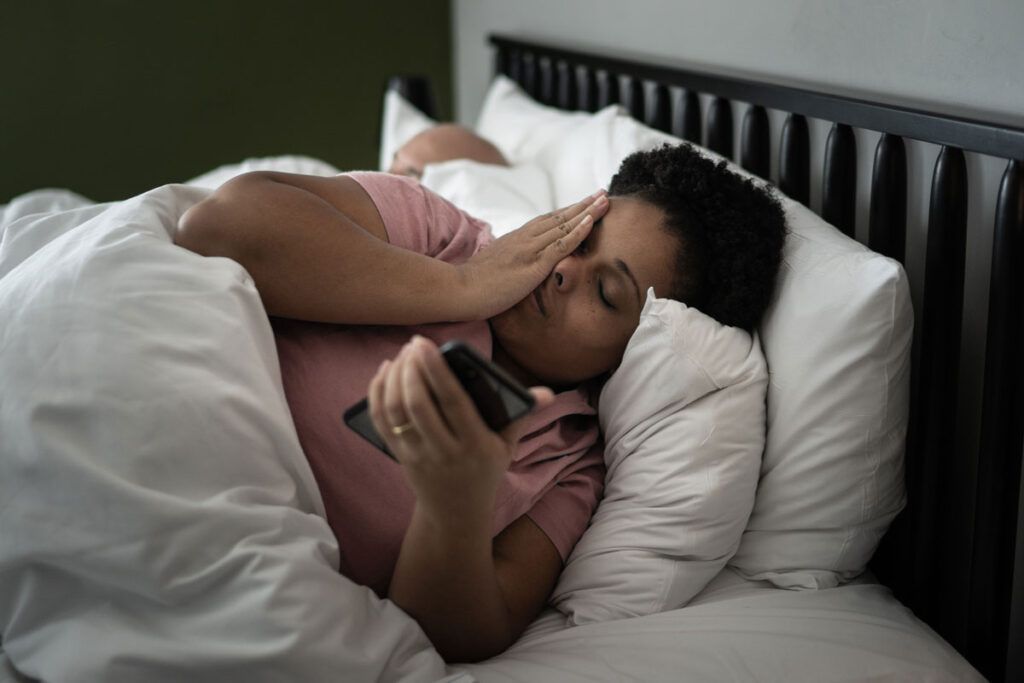Depression is a mental health condition that, according to the American Psychiatric Association (APA), affects around 1 in 15 U.S. adults in any given year.
Often, mental health professionals diagnose the condition based on a set of criteria established by the Diagnostic and Statistical Manual of Mental Disorders, 5th edition, text revision (DSM-5-TR).
After a consultation and review of your medical history, your health professional will try to identify at least five of the following symptoms:
- low mood that may involve sadness, hopelessness, or a feeling of helplessness
- loss of interest in most or all activities that you used to enjoy
- changes in your appetite that may lead to weight fluctuations
- changes in your sleep cycle, like insomnia (difficulty sleeping or lack of sleep) or hypersomnia (sleeping too much)
- fatigue (low energy)
- feelings of worthlessness and guilt
- difficulty concentrating, making decisions, or recalling information
- changes in the way you move (moving too quickly or slower than usual)
- thoughts or attempts of suicide
These symptoms must be persistent over time and across situations for at least 2 weeks and have no other possible cause, like a brain injury or substance use.
The relationship between depression and sleep

Sleep disturbances are common among people with depression. Up to 90% of people with depression have at least one sleep challenge. But not everyone experiences the same ones or with the same intensity.
The DSM-5-TR states that the two most common sleep disturbances for people with depression are:
- Insomnia: Experiencing persistent problems falling asleep or staying asleep.
- Hypersomnia: Feeling sleepy most of the day and sleeping longer hours than usual, including frequent naps.
Research suggests that around 80% of people with depression experience insomnia, and about 15–35% experience hypersomnia. In other words, it is more common for people with depression to find it hard to sleep, than it is to sleep more hours than usual.
Is oversleeping a symptom of depression?
Hypersomnia is a symptom of depression in many people, but not the only one. Sleeping more than usual is not, on its own, a sign you are developing depression.
To receive a diagnosis, a mental health professional must see at least four other symptoms that interfere with your daily life. They may also want to confirm you have had hypersomnia most of the days in the last 2 weeks or longer.
Do sleep disturbances cause depression?
The cause of depression is not yet understood. Experts believe it may be a combination of external and internal factors, including genetics, life experiences, and environment.
Sleep challenges alone do not cause depression. Still, not getting enough sleep or sleeping more than 9 hours every day may make you more prone to developing some symptoms of depression. Lack of sleep may also make the symptoms of depression worse.
Here is what the research says:
- The “Sleep in America” poll by the National Sleep Foundation (NSF) notes that people who have trouble falling or staying asleep 2 nights a week report more symptoms of depression than those without any sleep challenges. It is not clear, though, if the depression symptoms cause the sleep disturbances or vice versa.
- The NSF also suggests that over half of those people who don’t get at least 7 to 9 hours of sleep every night, had mild depression symptoms.
- A 2020 study of 316 mothers notes that lack of sleep led to a higher chance of depressive symptoms during and after pregnancy.
- A 2021 study suggests that people with depression who have both insomnia and hypersomnia may experience more intense depressive symptoms, like severe impairment in socialization, and a higher chance of suicide.
In some instances, lack of sleep may improve symptoms of depression. A 2015 study and a 2021 review suggested that sleep deprivation therapy may, for some people, improve depression symptoms for a short period of time. Sleep deprivation therapy involves intentionally missing sleep for one or more days.
Do depression medications affect sleep?
Sleep disturbances may be a side effect of some medications. Still, not everyone experiences the same effects or with the same intensity.
Common depression medications include:
- selective serotonin reuptake inhibitors (SSRIs) like sertraline (Zoloft), paroxetine (Paxil), and fluoxetine (Prozac)
- serotonin-norepinephrine reuptake inhibitors (SNRIs) like venlafaxine (Effexor), desvenlafaxine (Pristiq), and duloxetine (Cymbalta)
- tricyclic antidepressants (TCAs) like nortriptyline (Pamelor), amitriptyline (Elavil), and imipramine (Tofranil)
- monoamine oxidase inhibitors (MAOIs) like phenelzine (Nardil), tranylcypromine (Parnate), and isocarboxazid (Marplan)
- norepinephrine-dopamine reuptake inhibitors (NDRIs) like bupropion (Wellbutrin)
- N-methyl-D-aspartate (NMDA) receptor antagonists like esketamine (Spravato)
Research suggests that some of these antidepressants, especially SSRIs, SNRIs, and TCAs, are more likely to lead to difficulty falling asleep.
Consider discussing with your health professional which antidepression medications and dosage may be best for you.
If you need help covering the cost of medications, the free Optum Perks Discount Card could help you save up to 80% on prescription drugs. Follow the links on drug names for savings on that medication, or search for a specific drug here.
